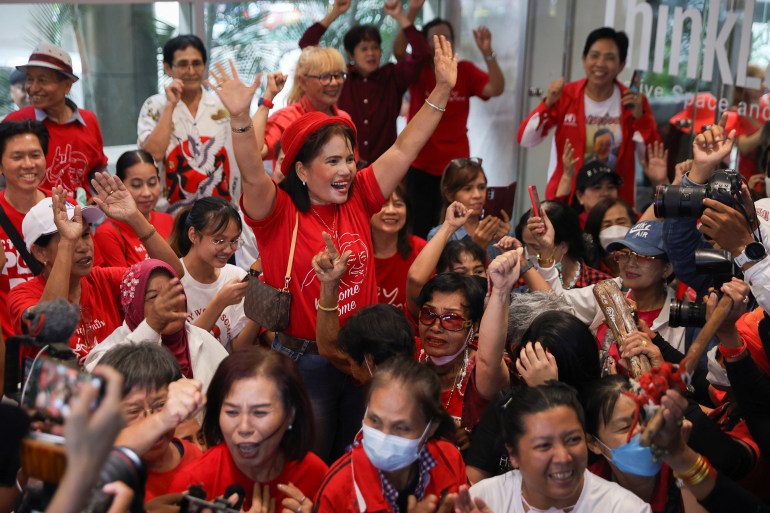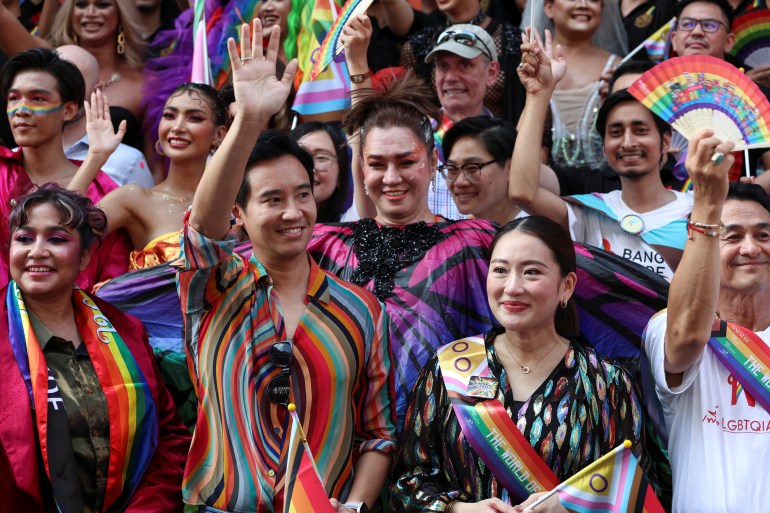Chiang Mai, Thailand – On September 5, Thailand unveiled its new cabinet – a coalition government that included both the self-declared pro-democracy Pheu Thai Party as well as parties supporting the military.
For both sides, it was a deal with the devil. Pheu Thai teamed up with the same military that overthrew its government in 2014 and one led by a predecessor party in 2006, and slaughtered dozens of its supporters during protests in 2010.
For the military, it formed a government with the same political group it had worked so hard to keep out of power, raising questions about its interventions and the turmoil of the past 18 years.
Six months on, there is no sign that Pheu Thai has delivered the policies and reforms necessary to win support among a reform-minded public in the face of such a controversial compromise, according to Ken Lohatepanont, a PhD student in political science at the University of Michigan.
“There is probably a sizeable core of Pheu Thai voters who remain loyal to the party and the Thaksin brand and who would stick to the party regardless of the deals it cut,” Lohatepanont said, referring to former Prime Minister Thaksin Shinawatra, who was overthrown in the 2006 coup.
“But for ‘softer’ Pheu Thai voters who were on the fence between voting for Pheu Thai and Move Forward in the last election, I don’t think that they’ve done nearly enough to justify the grand compromise they have made.”
A spokesperson for Pheu Thai did not respond to a request for comment.
The unholy alliance broke months of political deadlock.
The Move Forward Party (MFP) – which campaigned on a platform for more radical democratic reform and was a Pheu Thai coalition partner in opposition – won the most seats in parliament but was blocked from forming a government by the military-appointed Senate.

In particular, MFP drew anger from conservatives for pledging to reform the country’s draconian lese majeste law, which criminalises criticism of the king.
Pheu Thai steered clear of such controversial proposals and eventually jettisoned MFP, forming a government and soon after, secured pardons for Thaksin and his sister Yingluck Shinawatra, who was removed in a military coup in 2014.
Thaksin was freed from hospital – where he had been serving his prison sentence – last month.
Economic bailout
Pheu Thai and its predecessor parties were known for economic policies that helped poor farmers and revitalised the economy more broadly. Today, the Pheu Thai government seems to hope similar economic gains could paper over the political compromises it has made – neatly summed up by one of its campaign slogans: “Democracy you can eat”.
But so far, those hopes have not been realised. The party’s signature campaign promise of a 10,000 baht ($279) digital wallet for Thais earning under a certain monthly salary has been stymied by the central bank, while initial economic numbers have been worse than expected.
“Economic growth last year was very sluggish at only 1.9 percent. For a party that campaigned on its economic competence, that has not been a good look. Delivering on renewing the economy seems to be the bare minimum to give Pheu Thai even a shot at success at the next election – and even then I’m not sure it would be enough,” said Lohatepanont.
Syetarn Hansakul, a senior analyst at the Economist Intelligence Unit, said six months was perhaps too short to judge the Pheu Thai government’s economic performance.
“While Thailand’s headline GDP [gross domestic product] number was a disappointment, the details reflect the slower growth had much to do with policy paralysis as the country was run by a caretaking administration for most of 2023,” he said. “We expect Thailand’s GDP to strengthen this year as government spending normalises.”
Hansakul expects more infrastructure spending and a boost to Thai exports from China’s domestic stimulus package, while trade with the United States and European Union “will remain resilient”.
“We have revised Thailand’s real GDP growth to be around 3.4 percent in 2024,” he said.
Questionable reform commitment
However, delivering on economic success may not be enough to ensure Pheu Thai a return to office when the next election comes around in 2027, particularly in light of the growing scepticism around Pheu Thai’s commitment to democracy and human rights.
MFP activist-turned-parliamentarian Chonthicha Jangrew from Pathum Thani province spoke to Al Jazeera over the phone following a vote to revoke three orders issued by the military government in 2016.

The orders gave the armed forces control over administration in the country’s restive south, where Muslim separatists have waged a long-running revolt, thousands have been killed and the military accused of serious abuses.
“We want to remove all the laws that violate human rights,” Chonthicha said, adding that the unanimous vote shows MFP and Pheu Thai “can still agree together at some points”.
She said that while there had been “significant improvements” under the Pheu Thai government compared with its military-backed predecessors, including a plan to revive the stalled push to legalise same-sex marriage, she still had reservations.
“The new government is not only the Pheu Thai party, it’s also the political parties that supported the military government,” she said, adding that Pheu Thai at times seemed afraid to push for reforms that would anger the military.
Chonthicha is one of many activists facing lese majeste charges for an open letter she wrote to the king in 2020 calling for reform to the monarchy and criticising the royal budget.
“It’s really clear that the new government doesn’t want to mention or talk about this problem,” she said. “Even now, after the new government, we can still see there are many new cases against people who try to express their opinion.”
The big question is whether Pheu Thai would cooperate with a more full-blown crackdown on MFP. The party is facing various legal cases that could see its leaders arrested or the party dissolved, as happened to its predecessor the Future Forward Party. With the Senate not eligible to vote for the next prime minister, many expect MFP to cruise to victory without undemocratic intervention.
“I still feel a little bit like I can’t trust them,” Chonthicha said of Pheu Thai and its relationship with her party.
Lohatepanont said neither Pheu Thai’s failures nor its successes will have contributed to any significant shift in public opinion, which is still overwhelmingly with MFP.
The progressive party beat Pheu Thai by 10 percent in the 2023 popular vote and more recent polling conducted after Pheu Thai teamed up with the pro-military parties showed MFP 20 points clear.
A 28-year-old working in the tourism industry in Chiang Mai, who voted for MFP last year, said there was probably nothing Pheu Thai could do to win her vote. She said this was partly because the party cooperated with the conservative establishment, but also because she generally wants to see “change from [the] new generation”.
“For Pheu Thai, I feel like [I’m] reading the same book over and over again,” she said.









